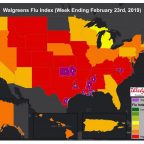Less than Half of Adults Are Concerned About the Planet They Are Leaving Behind For Future Generations
We have once again stumbled upon the time of year when green becomes the new black and many Americans find themselves attempting to recommit their efforts to the environment. This weekend marks the 47th annual Earth Day, but whether or not people make an extra effort to recycle in the coming weeks matters little compared to how they feel about the environment year round.
According to a recent survey by The Harris Poll, over four in ten Americans say they are concerned about the planet they are leaving behind for future generations (45%) and that they personally care a great deal about the current state, and future, of the environment (42%).
- This is especially true of urbanites (54%) and adults with children under 18 residing in their household (52%).
Meanwhile, over a third of adults consider themselves environmentally-conscious (37%) and personally responsible for taking care of the environment (35%). In addition, 34% say they encourage others to be more environmentally-friendly.
These are some of the results of The Harris Poll® of 2,319 U.S. adults aged 18+ and 512 teens aged 13-17 surveyed online between January 24 and February 03, 2017. Complete results of the study can be found here.
Labeling
When it comes to specific eco-friendly labels, Americans are much less likely to relate. Only a quarter of adults would label themselves a conservationist (25%), “green” (23%), or an environmentalist (21%).
However, young adults aged 18-34 are more likely than their older counterparts to consider themselves…
- A conservationist (33% 18-34 vs. 21% adults aged 35+);
- “Green” (33% vs. 19%, respectively); and/or,
- An environmentalist (31% vs. 16%, respectively).
Trending Positive
Compared to previous years, roughly the same proportion of adults are concerned about the planet we are leaving behind for future generations. Meanwhile, increasing numbers of adults (though still only a minority of all adults) now say they care a great deal, feel personally responsible, and encourage others to be more environmentally-friendly.
From Generation to Generation
American teenagers aged 13-17 are equally as likely as older generations to be concerned for our planet (41% teens, 45% adults) and environment (40% teens, 42% adults). And while they are also equally likely to feel a personal responsibility for taking care of the environment (32% teens, 35% adults), they are less likely than their elders to be proactive about making change to improve the world around them. Just under a third of teens (32%) consider themselves environmentally-conscious, while less than three in ten (29%) encourage others to be more environmentally-friendly; both of these show a marked 5 percentage point drop from where adults find themselves (37% and 34%, respectively).
|
2009 Total |
2010 Total |
2012 Total |
2013 Total |
2014 Total |
2015 Total |
2017 Adults |
2017 Teens |
|
|
% |
% |
% |
% |
% |
% |
% |
% |
|
|
I am concerned about the planet we are leaving behind for future generations. |
43 |
36 |
34 |
37 |
38 |
44 |
45 |
41 |
|
I personally care a great deal about the current state, and future, of the environment. |
36 |
34 |
31 |
38 |
36 |
38 |
42 |
40 |
|
I am environmentally-conscious. |
30 |
29 |
27 |
31 |
31 |
33 |
37 |
32 |
|
I feel a personal responsibility for taking care of the environment. |
29 |
29 |
27 |
30 |
28 |
30 |
35 |
32 |
|
I encourage others to be more environmentally-friendly. |
26 |
25 |
24 |
28 |
27 |
30 |
34 |
29 |
|
I am a conservationist. |
17 |
20 |
20 |
23 |
19 |
22 |
25 |
21 |
|
I am “green.” |
13 |
18 |
17 |
22 |
19 |
20 |
23 |
22 |
|
I am an environmentalist. |
13 |
16 |
16 |
18 |
15 |
17 |
21 |
23 |
To see other recent Harris Polls, please visit our website, TheHarrisPoll.com.
Want Harris Polls delivered direct to your inbox? Click here!
Methodology
This Harris Poll was conducted online, in English, within the United States between January 24 and February 03, 2017 among 2,319 adults aged 18+ and 512 teens aged 13-17. Figures for age, sex, race/ethnicity, education, region and household income were weighted where necessary to bring them into line with their actual proportions in the population. Propensity score weighting was also used to adjust for respondents’ propensity to be online.
All sample surveys and polls, whether or not they use probability sampling, are subject to multiple sources of error which are most often not possible to quantify or estimate, including sampling error, coverage error, error associated with nonresponse, error associated with question wording and response options, and post-survey weighting and adjustments. Therefore, The Harris Poll avoids the words “margin of error” as they are misleading. All that can be calculated are different possible sampling errors with different probabilities for pure, unweighted, random samples with 100% response rates. These are only theoretical because no published polls come close to this ideal.
Respondents for this survey were selected from among those who have agreed to participate in Harris Poll surveys. The data have been weighted to reflect the composition of the adult population. Because the sample is based on those who agreed to participate in our panel, no estimates of theoretical sampling error can be calculated.






